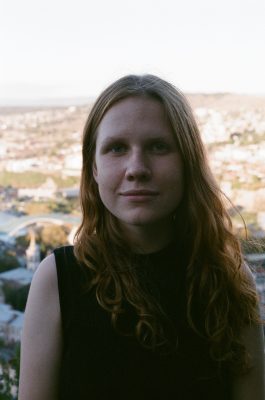
Roberta Rakauskaitė
IIRPS VU student
You will soon be finishing your bachelor’s studies at IIRPS VU; how do you reflect on these four years? What was the most memorable part?
For me, the study years were largely about the opportunity to explore, try and discover my own things. The studies themselves were a good foundation for that. The philosophy lectures in the first year were very engaging and I have to thank the lecturers for that. Later on, I started to concentrate more on human rights topics. At the same time, the opportunities that arose during my studies – two study exchanges, the opportunity to study a curriculum based on an individual plan, several internships in different fields or learning a new language – had a huge impact on my personal development. For me, the advantage of IIRPS is that I have enough freedom to discover my own areas of interest and to focus on them.
Since you have recently written your bachelor thesis, can you tell us what your topic was and how the writing process went?
The topic of my bachelor’s thesis is “Building everyday peace in a frozen conflict. The case of the conflict between Sakartvelo and Abkhazia”. At the end of my third year, I already knew that I would go on an exchange in Sakartvelo. Also, at that time I was very interested in transitional justice lectures, so it seemed natural that I would write about Sakartvelo. The exact topic developed while I was already living in Tbilisi, although, to be honest, it was difficult for me to be specific about it – I was interested in several slightly different aspects of the conflict between Abkhazia and Sakartvelo. The process of gathering information was lively during that six-month period – I took part in several discussions, took interviews and discussed the issues with people I met. At first, of course, a lot of things seemed unclear, but in reality, once I started to actively gather information and contact people, an interesting circle started to turn. In the environment I was in, some of the friends I met were also interested in similar issues, so the discussions that arose, I would say, were also part of the writing. I wanted to make the bachelor thesis interesting. And it was.
You spent half a year on a study exchange in Georgia, why did you choose this country and what are your impressions of life here?
I have wanted to go to Georgia for a long time, largely because I have a rather romanticised view of the country. I had already decided since about my second year that I would leave in my fourth year. Life in Georgia has been very varied – the stories about the hospitality of the people are true, I have found out, and the nature is truly spectacular. But it was also very politically charged – the effects of Russia’s war in Ukraine on Sakartveli were clearly visible, and during conversations, young people shared not only their fears of war but also their own memories. When talking to older people, I often heard the question: ‘How is it in Lithuania, is it good?’ This was followed by the thought that we were lucky. I keep telling my friends that nowhere else have I seen so many political statements in graffiti form – in the main streets of Tbilisi there are many EU and NATO flags, symbols of support for Ukraine. The same can be seen in most cafés and other establishments, not only in Tbilisi, but also more widely throughout the country.
So the impressions are varied. From a personal perspective, life has been much more chaotic, less predictable, but also more free. My friends and I used to joke that in Georgia, nothing goes the way we planned it. More generally, from a political perspective, life in Tbilisi has contributed very much to a deeper understanding not only of Georgia but also of the South Caucasus itself.
You worked at the Ministry of Foreign Affairs of the Republic of Lithuania while still studying; what was your experience like? How did your studies at IIRPS VU contribute to your career path?
During my studies, I was always thinking about working for the diplomatic service. However, from the outside, it is quite difficult to understand what the day-to-day work actually looks like. So, working at the MFA and getting to see a little bit closer to what the job of a diplomat looks like was useful and, I would say, a strong practical addition to my studies. I liked the dynamism of the work and the fact that I was able to contribute to a variety of tasks, both working specifically with the Vice-Minister and, more broadly, with the events organised by the Cabinet. In addition, the NATO Summit was taking place at the same time, so there was no shortage of excitement. Would I like to become a diplomat? I’m not sure; we’ll see. But this work experience has taught me a lot.
What would you like to wish the IIRPS VU community?
I wish the members of the community, like everyone else, to dream and make those dreams come true. I would also like to wish curiosity.







